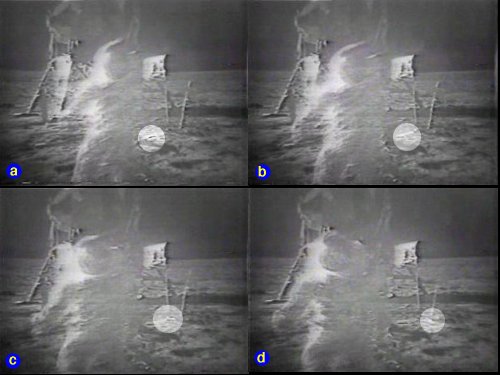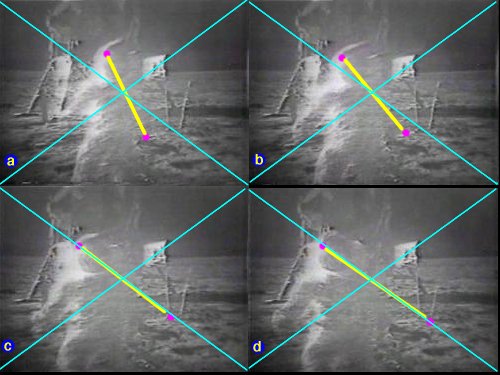|

|
|
Fig. 1 - Buzz Aldrin demonstrates locomotion while an
object appears to bounce across the lunar surface behind
him. (NASA: video downlink 110::14:03, et seq.)
|
|
|
 In the Apollo 11 video
you can see someone kicking a soda bottle across the surface behind
the astronaut. In the Apollo 11 video
you can see someone kicking a soda bottle across the surface behind
the astronaut.
In Fig. 1 Buzz Aldrin is demonstrating various methods of walking
on the lunar surface. He walks toward the camera using the typical
Apollo astronaut lope. He will later demonstrate the "kangaroo hop".
The object, which is more apparent in the video than in these still
images, bounces two or three times and then disappears from sight.
The video can be downloaded from the NASA public affairs office.
(MPEG,
8 MB) The frames in Fig. 1 are taken beginning 23 seconds into this clip.
The object in the frame is not actually a physical object. It is
the highlight on Aldrin's visor reflected in a peculiar way inside the
television camera lens. As Aldrin lopes across the frame from right
to left, the object bounces from left to right reflected through the
optical center of the lens. The technical term for this is catadioptrism, but photographers
usually call it "ghosting".

|
|
Fig. 2 - The same frames as in Fig. 1 with guide
lines to emphasize the reflection. The pink dots represent
the visor highlight and the "bottle"; the yellow line joins
them. The light blue lines identify the center of the
image. (NASA: video downlink 110::14:03, et seq.)
|
|
|
Fig. 2 illustrates the geometry more closely. In this particular
mode of catadioptric reflection, bright spots appear to reflect
radially through the center of the image. The diagonal blue lines
help locate the center of the photo by connecting the diagonally
opposite corners. This will closely approximate the optical axis of
the lens. The pink dots are placed on the "bottle" and helmet visor,
respectively. The yellow line connects them. Note that the yellow
line always passes through the center of the image, and that the pink
dots are always equidistant from the optical axis. This is
unmistakable evidence of catadioptrism.
Read more about the Coke bottle story here.


| 







 In the Apollo 11 video
you can see someone kicking a soda bottle across the surface behind
the astronaut.
In the Apollo 11 video
you can see someone kicking a soda bottle across the surface behind
the astronaut.

